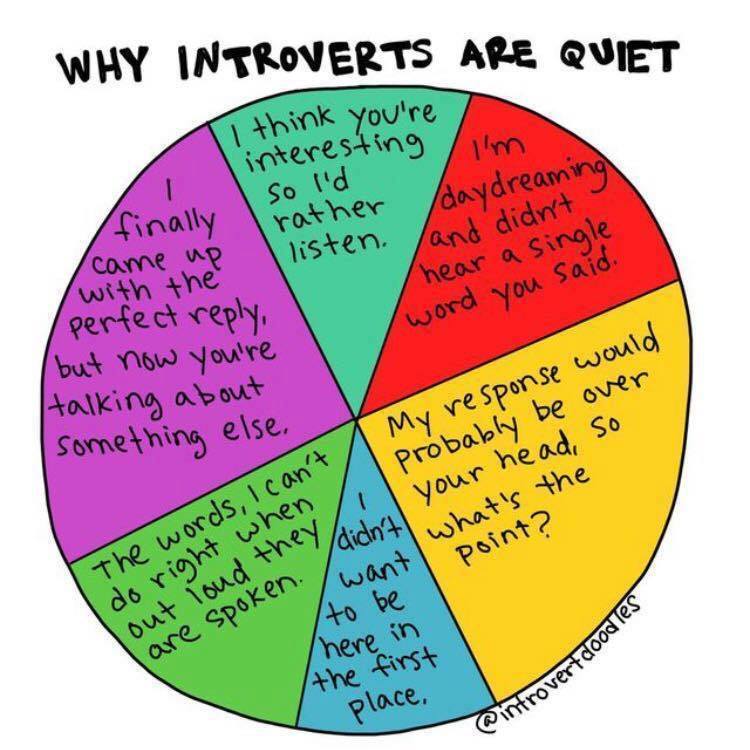five ways the church can better serve introverts
/I'm "the quiet one."
This is apparently my most notable characteristic, judging by the ways I have heard other people describe me. And I don't reject it; I embrace it. I am a very quiet and introspective person, a thinker and an inward-processor, someone who needs to spend a lot of time alone for optimal health. (All these are really just nice ways of saying I'm a hermit.)
As any introvert knows, it's not always easy to be a quiet person in a loud world. We are the anomaly; silent where noise is the norm, wordless where endless words are expected from us. We have something to say, but often aren't ready to say it until this age of instant gratification has long since moved on to something new.
And it's really no easier in our modern-day churches, which from an introvert's perspective often look like big, less-than-appealing social clubs that were not designed with the quiet person in mind.
And while we have open conversations about ways to make people of all different ethnic backgrounds feel comfortable, or ways we can make the unmarried feel whole and at home, I've never heard a single discussion about how churches can better serve - and thus, welcome - the introverted half of the population.
So I'm going to broach the topic myself - because I'm an introvert who has often felt alienated in churches, and I think it's important.
(There is, of course, a flip side to this conversation: How can introverts better serve the church? It's not all on "them" to make "us" feel comfortable, or vice versa. We are all here to love and serve each other. I'll share some thoughts on that next week.)
Disclaimer: I don't claim to be a voice for all introverts everywhere; nor do I mean to imply that every introvert is shy or socially anxious or a shut-in. Many of us are incredibly outgoing, with superior social skills and excellent emotional intelligence. Still, we are not extroverts, and we aren't best served in the same ways.
Here are some ways that the body of Christ might better serve the "quiet ones":
1. See us.
I've often joked that invisibility is my superpower. But, as a lot of quiet people know too well, my jest originates in a dead-serious pain - the pain of feeling quite alone and unseen.
No, we are not exceptionally loud or flashy. We may not light up the room or bring life to the party. In fact, being introverts, many times we might not even show up to the party - because our alone time is sacred. But just because we're quiet does not mean we're invisible (although we can only be ignored, talked over, or interrupted so many times before we begin to believe that actually, maybe we are).
I can't tell you what a difference it makes to be seen when I walk into the sanctuary on a Sunday morning - to receive someone's genuine smile and hello. To get a text in the middle of the week saying "I'm thinking of you," or to be invited to do something - even if I don't always accept. I don't need everyone to be my best friend (because I certainly don't have the social or emotional energy for that!), but I do need, for a moment, to remember that I'm not as invisible as I feel.
2. Hear us.
My fellow churchgoers have often complained - with astonishing candor - that I don't talk enough, and that I should contribute more during times of group discussion. Some have even said that I deserve to be ignored until I am forced, by isolation, to learn to open up. (Needless to say, comments like this are not helpful - or kind.)
The truth is, we have something to say. And oh, how we want to be heard! But we have finite social energy to spare, so we won't settle for merely hearing ourselves speak, or competing with the clamor of louder voices - no, we save our careful thoughts, words, and ideas for those who will listen.
If I don't talk or contribute "enough" in a discussion, it is not because I have nothing to say, nor is it because I'm willfully holding out or closing up. It's simply because for me, it's far worse to speak and not be truly heard than it is to not speak at all. So I look for those who will hear my heart, not those who will dismiss my silence.
The church can do a huge service to its introverts by hearing us - and by helping to create environments where we feel safe to be heard, by our standards. Very, very small groups or one-on-one opportunities are important - as is allowing enough time for trust and relationship to develop (even if it takes years). And the basic skill of asking genuine questions with a real desire to hear the answers goes a long, long way!
(Side note: I found the graphic below on Pinterest a long time ago, and it's quite possibly the most accurate description of introverts that I've ever seen. I thought you might enjoy it, too.)
3. Remember us.
Maybe more than anything else - even more than feeling unseen or unheard - what we feel most as introverts in the church is forgotten.
Church, as we practice it in modern-day America, is a highly social event. Most churches gather hundreds or even thousands of people together every week to sing, pray, and hear the Word preached. On weekdays, we gather in smaller (but maybe not truly small) groups to do Bible studies, youth activities, outreaches, or other ministries. And all this is good, for Christ's body is called to gather together, and to love one another.
But we might do even better to remember that the love of people and the building of the body doesn't always have to be done in an extroverted fashion.
For example, the three-minute "meet-and-greet" between praise songs may energize the extroverts, but it may simultaneously kill the whole morning's worship for the introverts, who are jolted out of the Throne Room only to be thrust into a few minutes' unnecessary small talk. We feel angry for being drawn away from the feet of Jesus, guilty for not responding "better," and ultimately forgotten by the rest of the church.
I'm picking on meet-and-greet time, but my point isn't that doing away with this will solve everything. My point is that churches can better serve their introspective believers by making a lot more space for quiet (for example, I love it when we get to have a long period of complete silence during the service for personal prayer, and wish it happened more often) and by patiently cultivating - not forcing - opportunities for slow-growing, deeply-rooted relationships to be made.
4. Value us.
Sadly, in the church as well as the world, we who are quiet or need more time to ourselves are often treated like there's something wrong with us - like being introverted is a weakness that needs to be "fixed," or a sin that needs to be forgiven. Sometimes it feels like our sanctification is being measured by how well we've managed to beat the quiet out of our personalities, usually in the name of "denying ourselves."
Of course, like everyone else, we have areas to grow in (I'll get into that next week), but no one is served well when we're taught to feel guilty for how God created us rather than to recognize the much-needed gifts we uniquely bring to the body.
No, we don't have the same strengths as extroverts. We may not love participating in popcorn prayer. We may not have a passion for striking up "intentional" conversations with total strangers. We may even say "no" to some of the invitations, requests, and obligations that come our way.
But we are no less spiritual for being a different kind of asset.
In truth, many who hate the meet-and-greet time are gifted at developing deep one-on-one relationships that build disciples. Many who would avoid praying aloud at all costs are doing battle in prayer every day behind closed doors. Many who can't fathom sharing the Gospel with the stranger sitting next to them on an airplane have lovingly labored decades for the soul of a family member.
The church will serve its whole congregation better - not just the introverts - by valuing us for who we really are, and allowing us to serve within our strengths, rather than forcing us into a mold we do not fit.
5. Learn from us.
And finally, once the body of Christ has learned to see, hear, remember, and value its quieter half, it can do one final and all-important service for us (which will in turn benefit the entirety of the body): learn from us.
Even though we aren't always loud and talkative, even though we sometimes have a more difficult shell to crack, even though we have to protect our alone time - there are things the church can learn from us. There is a treasury of wisdom hidden in the hearts of the quiet ones, just waiting to be mined.
In fact, with few exceptions, the most gifted Bible teachers, fiercest prayer warriors, wisest counselors, most authentic worshipers, and best friends I've ever had the privilege of knowing are introverts.
Some are quieter than others; some would catch your eye right away, and some take a bit of digging to discover. But they are all gems, treasures of God's Kingdom. And they all have so much to offer the church - they each have a unique place in the body and a unique role in strengthening the whole. So let them!
Ask them questions. Give them time and space and opportunity to share the love of Christ in their own individual ways. Open your eyes, your ears, and your heart - and be blessed.
Of course, this can't be a one-sided issue: a church may be serving its introverts very well, but if the quiet population is doing a poor job of serving the church in return, the weakness will remain unaddressed. So the second part of this conversation, coming next week, will deal with the other side of the question: how can introverts better serve the church?
In the meantime, what are your thoughts? If you're an introvert, what would you add to this list? If you're an extrovert, what are some ways the church could better serve you? Continue the conversation in the comments below!








